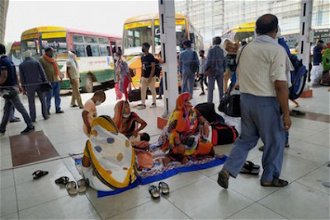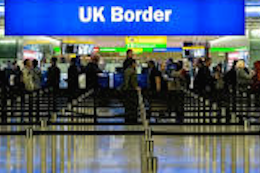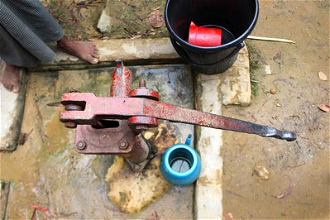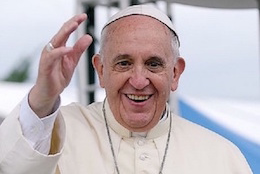Vatican calls for just policies, better conditions for migrants
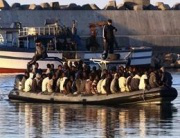
Bpat refugees
Pope Francis addressed the Pontifical Council for the Pastoral Care of Migrants and Itinerant People at the end of their Seventh World Congress for the Pastoral Care of Migrants, on Friday. The Congress then issued a message in which they call for civil society and governments "to work towards more comprehensive and just immigration policies, fully implementing international conventions to guarantee job opportunities and better living conditions, to prevent exploitation and/or trafficking of migrant workers.” The text of Pope Francis' address, and final conference message follow below.
Pope Francis' address to Pontifical Council for the Pastoral Care of Migrants and Itinerant People
1. I am pleased to be with you at the conclusion of the Seventh World Congress for the Pastoral Care of Migrants. I greet the President of the Pontifical Council, Cardinal Vegliò, thanking him for his kind words of introduction, and I also extend a fraternal welcome to the delegates from other Churches and Communities. To all of you I express my sincere appreciation for your commitment to and solicitude for the men and women who even today are undertaking the “journey of hope” on the path of migration. I thank you for all that you are doing. I assure you, and all those whom you seek to help, of my spiritual closeness.
2. The final Document from your last meeting five years ago affirmed that “migration is… an invitation to imagine a different future, which seeks the development of the whole human race; this includes then every human being with his or her spiritual and cultural potential and contribution to a more equitable world marked by global solidarity and by full respect for human dignity and life” (n. 3). Today, notwithstanding new developments and the emergence of situations which are at times painful and even tragic, migration is still an aspiration to hope. Above all in areas of the world in difficulty, where the lack of work prevents individuals and their families from achieving a dignified life, there is a strong drive to seek a better future wherever that may be, even at the risk of disappointment and failure. This is caused in great part by the economic crisis which, to different degrees, is affecting every country in the world.
3. Your meeting has highlighted the dynamics of cooperation and development in the pastoral care of migrants. First and foremost you have analyzed the factors which cause migration, in particular: inequality, poverty, overpopulation, the growing need for employment in some sectors of the global job market, disasters caused by climate change, wars and persecution, and the desire of younger people to relocate as they seek new opportunities. Moreover, the link between cooperation and development shows, on the one hand, the difference of interests between states and migrants, and, on the other hand, the opportunities which derive for both. In effect, receiving nations draw advantages from employing immigrants for production needs and national prosperity, not infrequently filling gaps created by the demographic crisis. In turn, the nations which migrants leave show a certain reduction in unemployment and, above all, benefit from earnings which are then sent back to meet the needs of families which remain in the country.
Emigrants, in the end, are able to fulfil the desire for a better future for themselves and their families. Yet we know that some problems also accompany these benefits. We find in the countries of origin, among other things, an impoverishment due to the so-called “brain drain”, the effects on infants and young people who grow up without one or both parents, and the risk of marriages failing due to prolonged absences. In the receiving nations, we also see difficulties associated with migrants settling in urban neighbourhoods which are already problematic, as well as their difficulties in integrating and learning to respect the social and cultural conventions which they find. In this regard, pastoral workers play an important role through initiating dialogue, welcoming and assisting with legal issues, mediating with the local population. In the countries of origin, on the other hand, the closeness of pastoral workers to the families and children of migrant parents can lessen the negative repercussions of the parents’ absence.
4. Your reflections, however, have wanted to go even further, to grasp the implications of the Church’s pastoral concern in the overall context of cooperation, development and migration. It is here that the Church has much to say. The Christian community, in fact, is continuously engaged in welcoming migrants and sharing with them God’s gifts, in particular the gift of faith. The Church promotes pastoral plans for the evangelization and support of migrants throughout their journey from their country of origin, through countries of transit, to the receiving countries. She gives particular attention to meeting the spiritual needs of migrants through catechesis, liturgy and the celebration of the Sacraments.
5. Sadly, migrants often experience disappointment, distress and loneliness. In effect, the migrant worker has to deal with the problem both of being uprooted and needing to integrate. Here the Church also seeks to be a source of hope: she develops programs of education and orientation; she raises her voice in defence of migrants’ rights; she offers assistance, including material assistance to everyone, without exception, so that all may be treated as children of God. When encountering migrants, it is important to adopt an integrated perspective, capable of valuing their potential rather than seeing them only as a problem to be confronted and resolved. The authentic right to development regards every person and all people, viewed integrally. This demands that all people be guaranteed a minimal level of participation in the life of the human community. How much more necessary must this be in the case of the Christian community, where no one is a stranger and, therefore, everyone is worthy of being welcomed and supported.
6. The Church, beyond being a community of the faithful that sees the face of Jesus Christ in its neighbour, is a Mother without limits and without frontiers. She is the Mother of all and so she strives to foster the culture of welcome and solidarity, where no one is considered useless, out of place or disposable. I wrote of this in my Message for the World Day of Migrants and Refugees this year: “It is less the criteria of efficiency, productivity, social class, or ethnic or religious belonging which ground that personal dignity, so much as the fact of being created in God’s own image and likeness (cf. Gen 1:26-27) and, even more so, being children of God. Every human being is a child of God! He or she bears the image of Christ!” Migrants, therefore, by virtue of their very humanity, even prior to their cultural values, widen the sense of human fraternity. At the same time, their presence is a reminder of the need to eradicate inequality, injustice and abuses. In that way, migrants will be able to become partners in constructing a richer identity for the communities which provide them hospitality, as well as the people who welcome them, prompting the development of a society which is inclusive, creative and respectful of the dignity of all.
Dear brothers and sisters, I wish to renew my gratitude for the service which you give to the Church and to the communities and societies to which you belong. I invoke upon you the protection of Mary, the Mother of God, and Saint Joseph, who themselves experienced the difficulty of exile in Egypt. I assure you of my prayers and I ask you to pray for me. To all of you I willingly impart my blessing.
Final Message from the Pontifical Council for the Pastoral Care of Migrants and Itinerant People
The Seventh World Congress for the Pastoral Care of Migrants, organized by the Pontifical Council for the Pastoral Care of Migrants and Itinerant People, was held at the Pontifical Urbaniana University, Vatican City, from Monday, November 17th to Friday, November 21st, 2014. The proceedings focused on the phenomenon of migration and migrants, in the light of the theme: “Cooperation and Development in the Pastoral Care of Migrations”.
Gathering together nearly 300 participants, which include delegates from Bishops' Conferences, commissions and Church structures and partners from over 90 countries, the objective of the Congress was to reflect upon the current migration situation that so strongly marks modern-day society, and to seek and propose a renewed Catholic pastoral approach to the phenomenon within the Church at international, regional and local levels.
The pastoral care of the Catholic Church, expressed in specific programs and plans of action, takes into consideration the particular situation of economic migrants, who live between the realities of uprooting and that of integration. Pastoral programs concern the spiritual search of the sense of life, experiences of welcome, sharing and reconciliation, the proclamation of the Gospel, the Liturgy, the celebration of the Sacraments. At the same time, the pastoral solicitude also cares towards basic needs of migrant workers such as legal assistance in the regularization process of their status, the defense and the promotion of their dignity, decent jobs and housing. Christian communities continue to be spaces of hope and action, advocating on behalf of migrants (particularly children, unaccompanied minors, women and persons with disabilities), that raise awareness, protect and extend the necessary assistance, whatever their status.
Presentations, discussions and sharing of experiences helped to address the issue of the migrants’ family with all positive aspects that contribute to strengthen and promote fruitful human relationships, which are the basis and the core of all societies. Emphasis has been given on family separation, caused by the lack of adequate migration policies, which is especially challenging in countries with a large diaspora.
Furthermore, the feminization of migration is a new characteristic. Migrant women are no longer moving within processes of family reunification mainly, but also as bread-winners. Migration, therefore, can be an instrument of empowerment for women but also a threat when criminal nets take advantage of their vulnerability and force them into smuggling, trafficking, and even prostitution and labor exploitation.
Similarly, young migrants carry a great potential in building bridges of cooperation between societies towards development. The pastoral care of young migrants concentrates on their religious and integral formation, assisting them to be active bridges between cultures, both for the benefit of society and Christian communities.
Migration continues to be a sign of modern times, deeply marked by growing fear and lack of hospitality. In this regard, the centrality of the human person and the respect for his/her dignity are of even greater importance, preceding any religious, ethnic, social or cultural differences.
The participants of the Meeting encourage all actors, including civil society and governments, to work towards more comprehensive and just immigration policies, fully implementing international conventions to guarantee job opportunities and better living conditions, to prevent exploitation and/or trafficking of migrant workers.
The participants appeal to the responsibility of the whole international Community to contribute to the common good and to the universality of human rights, underlining the need for a positive change in attitude towards migrants.
Finally, the Pontifical Council for the Pastoral Care of Migrants and Itinerant People and the participants recommend collaborative action amongst all Church structures in the countries of origin, transit and destination to implement the considerations and conclusions of the Congress, which will be published.
Source: VIS



